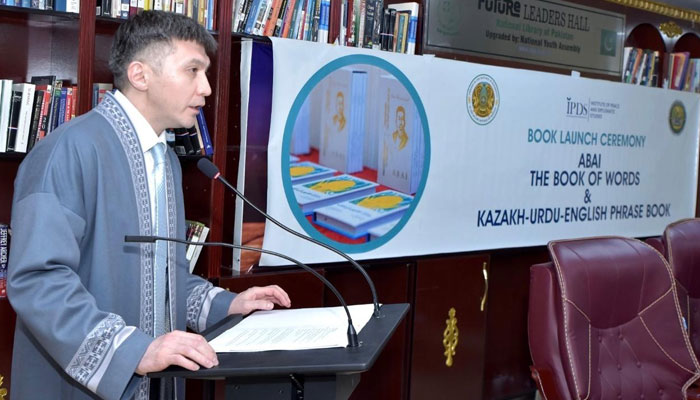Kazakh poet’s ‘Book of Words’ launched
Islamabad:Ambassador of Kazakhstan to Pakistan, Yerzhan Kistafin on Tuesday said the national poet and intellectual of Kazakhstan Qunanbaiuly Abai’s left an indelible impression on the socio-economic landscape as literature and culture of Kazakhstan and his ideas are the foundation for modern Kazakhstan, says a press release.
“His ideas laid the groundwork for the Kazakh cultural renaissance of the 20th century. Qunanbaiuly Abai’s poetry and books have been translated into many languages of the world, which taught the whole world about humanity, peace and common prosperity,” he said. The ambassador said at the book launch ceremony for ‘Book of Words’ by Abai, translated into Pashto, Punjabi, Sindhi, and Balochi, alongside a Kazakh-Urdu-English phrasebook, organised by the Institute of Peace and Diplomatic Studies in collaboration with the National Library of Pakistan and the Embassy of Kazakhstan to Pakistan.
Today, Abai Qunanbaiuly’s legacy is alive and thriving, inspiring generations of writers, thinkers, and activists, he said. The ambassador said that during Qunanbaiuly Abai’s era, several important socio-political and socio-economic changes occurred in Kazakhstan. Abai’s creative poetry affected the philosophical thinking of educated Kazakhs, he said. The leaders of the progressive Alash Orda movement saw him as their inspiration.
He participated in the governing of the country and played a certain role in trying to resolve complicated problems of society justly. Throughout his life, Abai faced numerous challenges, including political oppression and personal tragedy, he said. Despite these obstacles, he remained committed to his principles and continued to inspire others through his writings and actions.
He advocated for the modernisation of Kazakh society, including the promotion of education, the empowerment of women, and the preservation of Kazakh cultural heritage. Abai passed away in 1904, but his legacy lives on and his contributions to Kazakh literature, culture, and society continue to be celebrated and studied, both in Kazakhstan and around the world, he said.
-
 Is Human Mission To Mars Possible In 10 Years? Jared Isaacman Breaks It Down
Is Human Mission To Mars Possible In 10 Years? Jared Isaacman Breaks It Down -
 ‘Stranger Things’ Star Gaten Matarazzo Reveals How Cleidocranial Dysplasia Affected His Career
‘Stranger Things’ Star Gaten Matarazzo Reveals How Cleidocranial Dysplasia Affected His Career -
 Google, OpenAI Employees Call For Military AI Restrictions As Anthropic Rejects Pentagon Offer
Google, OpenAI Employees Call For Military AI Restrictions As Anthropic Rejects Pentagon Offer -
 Peter Frampton Details 'life-changing- Battle With Inclusion Body Myositis
Peter Frampton Details 'life-changing- Battle With Inclusion Body Myositis -
 Waymo And Tesla Cars Rely On Remote Human Operators, Not Just AI
Waymo And Tesla Cars Rely On Remote Human Operators, Not Just AI -
 AI And Nuclear War: 95 Percent Of Simulated Scenarios End In Escalation, Study Finds
AI And Nuclear War: 95 Percent Of Simulated Scenarios End In Escalation, Study Finds -
 David Hockney’s First English Landscape Painting Heads To Sotheby’s Auction; First Sale In Nearly 30 Years
David Hockney’s First English Landscape Painting Heads To Sotheby’s Auction; First Sale In Nearly 30 Years -
 How Does Sia Manage 'invisible Pain' From Ehlers-Danlos Syndrome
How Does Sia Manage 'invisible Pain' From Ehlers-Danlos Syndrome -
 Halsey Mentions How She 'gained Control' Over Endometriosis Condition
Halsey Mentions How She 'gained Control' Over Endometriosis Condition -
 Teyana Taylor Says Choosing Movies Over Music 'dumb' Choice?
Teyana Taylor Says Choosing Movies Over Music 'dumb' Choice? -
 Poland Joins Spain In Move To Ban Social Media For Children Under 15
Poland Joins Spain In Move To Ban Social Media For Children Under 15 -
 Shia LaBeouf Sent To Rehab For Not Taking ‘alcohol Addiction Seriously’
Shia LaBeouf Sent To Rehab For Not Taking ‘alcohol Addiction Seriously’ -
 ‘Stingy’ Harry, Meghan Markle Crack Open A Chasm Despite Donation: ‘Do So At Your Own Peril’
‘Stingy’ Harry, Meghan Markle Crack Open A Chasm Despite Donation: ‘Do So At Your Own Peril’ -
 Research Explores How TikTok’s Recommendation System May Influence Teen Beliefs
Research Explores How TikTok’s Recommendation System May Influence Teen Beliefs -
 Google Wins Approval To Export South Korea’s High-precision Maps After 20 Years—With Strict Conditions
Google Wins Approval To Export South Korea’s High-precision Maps After 20 Years—With Strict Conditions -
 King Charles’ Health Battle: What Has Been Revealed About His Cancer So Far
King Charles’ Health Battle: What Has Been Revealed About His Cancer So Far




